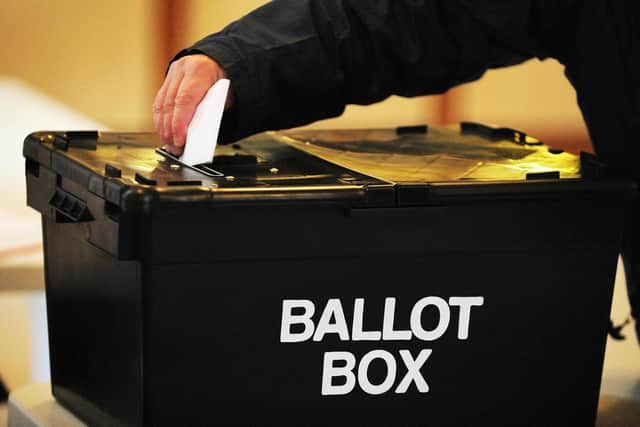Campaigners urged more women to stand for election after figures reveal only two in five of Bassetlaw's councillors are female
and live on Freeview channel 276
With research by the Fawcett Society and Democracy Club showing women make up just a third of councillors across England's local authorities, campaigners say more needs to be done to ensure female voices are heard in council chambers.
At Bassetlaw District Council, 19 of 47 councillors were female – at 40 per cent, a smaller proportion than was recorded five years ago, when 23 of 48 councillors were women.
Advertisement
Hide AdAdvertisement
Hide AdAnd at Nottinghamshire County Council, 15 of 66 councillors in 2021 were female – at 23 per cent, a smaller proportion than was recorded five years ago, when 17 councillors were women.


Frances Scott, founder of the 50:50 Parliament campaign group, said women have been consistently outnumbered in political systems nationally and called for more to be done to boost the number of female politicians and ensure their voices are heard.
She said: "Women's experiences of local transport, of education, of juggling a career and parenting, of violence, of healthcare and maternity services are simply not properly represented and society is losing out.
“We need to support women to stand for elected office so that our local governments and Parliament can draw upon the widest possible pool of talent and the 32 million women who live and work in the UK can have an equal share of voice."
Advertisement
Hide AdAdvertisement
Hide AdThe number of female councillors across England has grown in recent years, with 6,021 now in council chambers, up from 5,802 in 2017. That means 35 per cent of council seats nationally are held by women, up from 33 per cent five years ago.
Worksop's Sybil Fielding, who is a district and Notts county councillor, said Labour has been "very proactive" in trying to encourage more women to stand, adding that "we certainly do need more women to be represented.”
Coun Fielding said that her favourite thing about being a councillor is “being able to voice the opinions of the community she serves and to make a difference.
"It’s not a nine to five job, sometimes you’re dealing with people that are in crisis and one of the most valuable things is to listen to people and try and do your best to help them,” she added.
Advertisement
Hide AdAdvertisement
Hide AdDenise Depledge, Conservative district councillor for Sutton, when asked bout gender representation on Bassetlaw District Council, said: “The ideal situation would be 50/50 - it should be equal.
"Maybe in the next election in May, we could see some more representation.”
Coun Depledge echoed the views ofother councillors about why they chose to stand, when she said the role is about helping and supporting residents as much as they can.
Jemima Olchawski, chief executive of the Fawcett Society, described the pace of change in local government as "glacial".
Advertisement
Hide AdAdvertisement
Hide AdShe said: "The 2021 local elections saw a lot of new councillors elected but we saw more of the same.
"Almost all councils continue to be dominated by men.
"It's not good enough – we need to see our political parties setting out, and committing to, action plans which will improve diversity and improve society for us all."
Coun Susan Shaw, who represents East Retford East on Bassetlaw District Council, said she is working with some young women to see if they want to nominate themselves to stand as local councillors in elections in 2023.
Commenting on whether she believed her experience of being a councillor was any different to that of her colleagues given that she was a woman, she said: “Yes. I do think it’s very different.
Advertisement
Hide AdAdvertisement
Hide Ad"Even though we’ve got a lot of councillors with awareness of issues, women naturally have more awareness of issues like terminology, meeting spaces and times and women’s safety issues.”
In an effort to improve female representation, the Fawcett Society has called for the continuation of remote council meetings and the implementation of maternity policies at all councils.
The Local Government Association, which represents councils, has echoed those calls and is working with local authorities to increase diversity and inclusion.
Coun Marianne Overton, vice chair of the LGA, said: “We know that many prospective councillors are put off standing because of their already busy lives.
Advertisement
Hide AdAdvertisement
Hide Ad"We want to see more women, parents and carers stand for election and encourage them to step up to leadership roles in local government, while still being able to live their lives outside of the council chamber.
“Councils want to create a working environment which is attractive and supportive for people from all groups and backgrounds, to help further improve representation locally while producing the next generation of civic leaders.”
The Government is expected to respond soon to the findings of a call for evidence conducted in response to calls from councils to retain remote or hybrid meetings post-pandemic.
A spokeswoman from the Department of Levelling Up, Housing and Communities said the Government recognised the importance of gender equality and urged councils to do more to attract a diverse range of candidates.